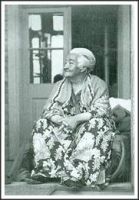Kazimiera Bujwidowa
Why I consider this woman to be an important person?
Kazimiera Bujwidowa at the turn of the XIX century worked in Krakow. Her life could have closed in the domestic sphere - the mother of four daughters, two sons and wife of a professor of bacteriology Odon Bujwid. However, today it is difficult to imagine what the women's emancipation movement in Krakow would be without Bujwidowa She participated in the most important actions as an organizer, journalist and editor. She fought with her conservative environment to achieve for women for what now seems obvious: the right to vote and the opportunity to study.
It is thanks to Kazimiera Bujwidowa on the Jagiellonian University in 1896 the first girls students were accepted.
Biography
Kazimiera Bujwidowa came from the environment of Lithuanian gentry. She was an illegitimate child of Kazimierz Klimontowicz and Louise Szczęśniewska. After the early deaths of her mother her father's sister Petronela Klimontowicz Carolina, a member of the January uprising took care of her. Kazimiera graduated from the Warsaw boarding school for girls and gained capabilities of a home teacher. Due to lack of the consent from her aunt she did not go to study in Geneva (studies in the Russian and Austrian partitions were not possible for women), so she enrolled in a tailoring course and at the same time as a student of the Flying University studying biological sciences.
In 1886 she married Odon Bujwid, becoming his closest coworker and assistant. In 1893 the family moved to Krakow, where her husband took over the Institute of Bacteriology and Hygiene, at the Jagiellonian University, and Kazimiera address the administration set up by her husband of the Department of Serums and Vaccines Manufacturing, and actively participated in the social - educational movement of and feminist initiatives. She also worked at the Society for Folk Schools, where she came into contact with feminists, Maria Siedlecka and Maria Turzyma - Wisniewska. Together they were engaged in the fight with adult illiteracy, spreading of education, delivering lectures, setting up free lending libraries. Bujwidowa was co-organizer and president of the Krakow Reading Room for Women, which played an important role in the emancipation of women in Galicia.
Her unfulfilled dreams of higher studies turned her attention to the issue of the education of women.
In 1891, at the instigation of Bujwidowa, Jan Karłowicz (ethnographer, linguist) at the congress of naturalists and physicians put forward the request for Polish women to have the possibility of studying at universities in Krakow and Lviv.
In 1894, at the Congress of Polish teachers in Lviv Bujwidowa gave a lecture which largely contributed to the support of an application for the admission of women to universities. In addition, she initiated actions of individual and collective applications of women for the right to study. Was a great success. In 1896 the first girl-students were accepted at the universities. In the years 1896 – 1906, as President of the Society of Girls' High School she led to the creation of the first high school for girls, on the Polish lands, with a„male” educational program and to passing of exams in girls’ high schools equivalent to the male ones. At the same time she took part in the fight for women's political rights.
In the years 1906-1908 she participated in election campaigns and feminist rallies, demanding equal rights for women in the elections to the local authorities and to the Galician National Parliament. She also joined the campaign of Mary Dulębianka - the first woman candidate to the Parliament.
Bujwidowa cooperated with the feminist magazine "New Word" edited by Maria Turzyma. She published articles in "New Reform", "Critique", "New Tracks" and "Helm".
During World War, together with her husband and daughter, she founded a hospital for wounded soldiers of the Polish Legions. After the war, as a result of a chronic disease she withdrew from active social activities. She continued to work in the Department of Serums and Vaccines. She had six children: Kazimiera, Sophia, Hedwig, Helen, John and Stanislaus.
She died in Krakow on the 8th of October 1932.
Bibligraphy
- Dormus Katarzyna, „Kazimiera Bujwidowa 1867-1932. Życie i działalność społeczno-oświatowa” Kraków 2002
- Hulewicz Jan, „Sprawa wyższego wykształcenia kobiet w Polsce w XIX wieku”, Kraków 1939.
Links
- www.dziejekrakowa.pl/biogramy (available 04.06.2013)
- www.feminoteka.pl/muzeum/ (available 04.06.2013)
- http://pl.wikipedia.org/wiki/Portal:Kategorie_G%C5%82%C3%B3wne#Biografie (available 04.06.2013)
Picture source
pod red.Ewy Furgał, „ Krakowski szlak kobiet. Przewodniczka po Krakowie Emancypantek, wyd. Fundacja przestrzeń kobiet, Kraków 2009, str.42 (Under edit, Ewa Furgał, ,,Krakow women' s trail. Guide in suffragist's Krakow " published by the Foundation Space for Women in Krakow in 2009, page)http://www.przestrzenkobiet.pl/images/DOWNLOAD/krakowski_szlak_kobiet_przewodniczka_tom%20i.pdf, Rights: PD and the consent to place the photo on the website given by Ewa Furgał who is the editor of the publication.




